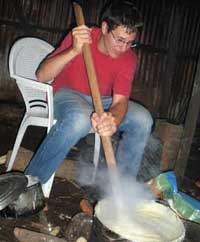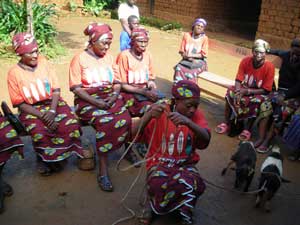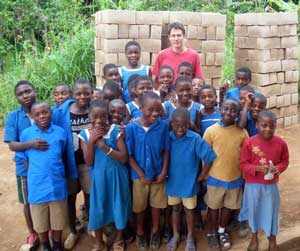
Why did you decide to intern abroad with RUDEC?
Theo: I was just finishing a study abroad year in Washington D.C., where I had the opportunity to intern in a small non-profit advisory which worked for the World Bank and USAID. I had known for a while that I was interested in development but I hadn’t been on the field yet. Besides, I wanted to keep discovering new things. So I started looking on the internet.
I chose RUDEC because it did look like an organization with a purpose where you could actually make a difference, not just some “humanitarian tourism” NGO that are aimed at charging unexperienced volunteers that want to go abroad and help. To me, RUDEC’s focus on impact was visible by the way we started discussing ideas on projects even before I got there, and by the organization’s transparency on the nature and sharing of costs. Short-term volunteering of non-professionals is often decried as counter-productive, but in a context like RUDEC’s, volunteers with purpose can actually make a very positive difference if they have skills that can be useful.
What made this intern abroad experience unique and special?
Theo: The experience turned out to be pretty intense: warm and welcoming people, wonderful landscape, immensely meaningful activities, great support from organization, but also harsh poverty everywhere…
Professionally, the philosophy of Joshua is to support you in doing the things that you both feel will make you most useful to the community. So it means that you have a great decision making responsibility over your job. That is how we started an orphan sponsorship program, French teaching in primary schools (it is the main language of the country, whereas RUDEC’s area speaks English, teaching computer to adults, improving RUDEC’s communication and financial reporting, upgrading the website, and others.
I definitely learnt a lot about myself and about how it felt to be making a difference.

How has this experience impacted your future?
Theo: It has impacted my future in many ways. It has confirmed to me that what I valued most in terms of professional perspectives: challenge, discovery, and impact on people’s lives. That is why I stayed in development. When I later decided to go work for two years in Addis Ababa, Ethiopia, I did it without hesitation: I knew it was going to be like nothing I had ever experienced before, and I knew this would be a major source of enjoyment.
I have also derived from this internship at RUDEC a certain self-confidence in my ability to adapt and think creatively, which has always helped me in being proactive.
Also, of course, I have valued this internship in the course of later recruitments as a field experience very appreciated in my field.
What is one piece of advice you'd give future RUDEC students?
Theo: I would advise them to come prepared to give the best they have, for two main reasons:
The work environment is not so easy at first: it is difficult to walk past children with bellies swollen by malnutrition. The way I dealt with it is by working very hard: when you do well and you feel you’re making a difference, life feels awesome.

As I said earlier, RUDEC empowers its interns to put their own talents and vision at the service of the community. This comes with an added responsibility of doing the best you can, because no one will do it for you, and it is possible that no one will do it after you for a while.
Did you run into a language barrier? Did you ever think you knew more/less of the language?
Theo: The native tongue of most people is Kom, the local language. However, most education starting at primary level is done in English, and school attendance has been quite good in the area in recent years. So visitors will be able to communicate easily with most kids and young adults, and are most likely to always find an English speaker around to help them communicate with infants and older people. In the end, this is part of the social experience. And of course, grasping a few words of kom is not as difficult as it is rewarding...